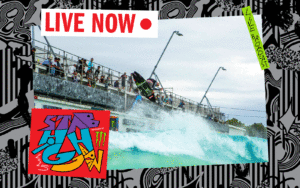Have You Heard Of The Leviathan Gas Field?
How 992 local Israeli surfers are standing up to media blackouts and corrupt government officials.
The subject of Israel is inherently fraught with conflict.
As a writer, it is tempting to ignore, to wash my hands and focus on something easier. Find topics that won’t reel in aggrieved parties no matter what the perspective.
But the average human is more or less the same, regardless of religion or national origin. We all share a duty to protect our environment for the future. No matter how you feel about the existence of Israel, and the myriad political topics that spring from it, the development of the Leviathan gas field and the desire for environmentally sound practices in the course of its exploitation is one that should ring true for anyone who loves salt water.
The Leviathan gas field is a massive natural gas deposit located in the Eastern Mediterranean, off the coast of Israel. It was discovered in 2010 by geologist Eitan Aizenberg of Ratio Oil Explorations. In the wake of the discovery Ratio brought on Israeli conglomerate, Delek, as well as Noble Energy, a petroleum and natural gas exploration and production company based out of Houston, Texas.
The possibilities for the gas field are massive. Some estimates claim that it contains enough natural gas to support Israel’s energy needs for the next forty years. Realistically, the gas will be pumped across the country and sold on the foreign market.
At issue is the fact that the development plans include the construction of thirty two near-shore gas rigs a mere 10km off the coast of some of Israel’s most beloved beaches and the prior record of pollution stemming from pre-existing rigs. Gas condensate, a toxic byproduct of natural gas extraction composed of water and heavy metals, does massive damage to the environment, has terrible implications for the health of nearby residents, and has been demonstrated to taint local waters of rigs. Opponents of the project claim that an existing extraction operation 23km off the coast of Ashkelon dumps more than twice the permitted amount of condensate into its waters.
Further complicating matters is the fact that Israel currently attains 80 percent of its water supply from desalination plants located near the existing, and proposed, natural gas rigs, leading to fears that the exploitation of the resource will lead to toxic drinking water for the majority of the country.
On the front lines of opposition to the project is the Homeland Guard Organization, which orchestrated a world record paddle out in protest this past June. Featuring 992 local surfers. it was dubbed in Hebrew the “Surfing Circle of Honor” and called for the protection of Israel’s beaches and sea ecosystem from the long-term destructive effects which would be engendered by nearshore gas rig operations.
It is, perhaps, not the best name for a group focused on preserving the environment, something that Ronen Babayoff, a leading voice in the fight against the development, acknowledges. “Unfortunately the people who came up with the name are not fluent in English, so they didn’t take into account the connotations [of the name.]”
As of now the plans remain unchanged and the platforms will be built in their proposed locations, partially due to the fact that activists have struggled to make their voices heard.
“The anti-trust laws in Israel are pretty much fucked up,” Babayoff said, “because the oil companies also own the media. So there was a media blackout until the surfing circle was able to go into mainstream media a bit more.
But the grassroots efforts seem to be taking hold, and Babayoff is optimistic about the future. He is busy giving lectures in an effort to raise awareness of the issue.
“We are growing exponentially. We believe that within a few months half of the population of Israel is going to be behind our cause.”














Comments
Comments are a Stab Premium feature. Gotta join to talk shop.
Already a member? Sign In
Want to join? Sign Up